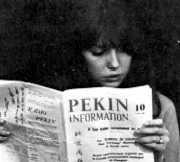who the hell is bertholt brecht?

Bertholt Brecht is a German playwright who wrote plays from around 1920-1950. He is well known for bringing politics and revolution to the theatre, a traditionally bourgeois domain. He is credited with the modern reworking of the epic which existed in ancient Greece as the less entertaining relative to the tragedy. Unlike the tragedy in which a story is generally one of personal or moral crisis the epic portrays these same events in at a societal level. No longer is the public allowed the cathartic release felt when the protagonist suffers an injustice of society which is inflicted on him, free to return to their comfortable lives. Instead they must laugh at the ridiculous nature of society portrayed as a farce, in which the previously personal injustice is only one of many. This laughter is not produced in the context of good hearted fun, it is the awkward laughter produced when an unfunny situation is presented in a funny way. It does not provide a release but instead creates a pressure. It is designed to make people aware of the injustices in (capitalist) society, to depersonalise situations so people realise that it could happen to them. The epic is designed to foster revolutionaries not mere rebels. This reworking of the epic was designed with communism in mind answering Lenin's question 'How and what should we learn?' no longer are personal morals enough we must have a social conscience.
The Cinema of Jean-Luc Goddard
La Chinose (1967)
The irony of bourgeois students using their summer holidays to set up a kind of break away Maoist utopia parodies the Brechtian notions of art as a representation of social conscious. Like the students the film is too stylistically pretty to be propagating the wisdom of Mao. The primary colours, the good looking actors, the Frenchness of it all clash with the philosophy. The exercises performed on the balcony and back dropped by suburbia, all be it a French one, the students learn in a contrite lecture theatre complete with blackboard and the apartment in general is too grand to be home base of a people's revolution. Their actions seem fake like they are merely acting the part of student activist from their safe haven. The cuts between the students and the chickens and the streets further emphasises this by parodying the meaning of their words and showing the audience the lack of depth the students have in their peoples revolution. The scene in which the war in Vietnam is reenacted also refers to this metatextual element. The audience seems to be challenged to judge whether this play is any more ridiculous than the greater play going on.
Further metatextual elements can be found in
Week End (1967)
The films bourgeois married couple, Roland and Corrine find themselves reduced to pedestrians after their car crashes in a consumerist apocalypse on their way to kill Corrine's father. Corrine's blood curdling screams are chilling as she mourns the destruction of her Hermes handbag. As they continue their journey on foot they meet the Alice in Wonderland like character of Emily Bronte who talks in riddles. A stand off between film and book takes place and the film characters of Roland and Corrine triumph beating up Bronte and lighting her on fire. The annihilation of the text however is only one of the casualties of the destruction of consumerist society, cars are destroyed, designer clothes left to burn on the crash victims and anarchy reigns in an increasingly absurd journey. Stylistically the ten minute dolly shot of the initial traffic jam cannot be forgotten. The bold coloured cars in red, white, green, blue, black and yellow (perhaps orange as well) contrast with the washed out country side. These colours are mirrored in the clothing of the consumers and the blood that they spill. This exaggerated violence as well as the overt sexual tones, such as in the opening scene where Corrine retells a sexual encounter, make the audience laugh uncomfortably in the tradition of the Brechtian epic. Each scene is self contained but their temporal order is important following the disintegration of society and logic to the absurd.
"I am here to inform these modern times of the grammatical era's end
and the beginning of flamboyance especially in cinema." -- Joseph Balsamo in Weekend
A side note: Bertholt brecht has also been mentioned in my Italian Theatre class when studying Dario Fo's 1970 play - accidental death of an anarchist which makes use of the epic farce genre and has obvious revolutionary undertones.
"A theatre, a literature, an artistic expression that does not speak for its own time has no relevance."
DARIO FO, Nobel Lecture, December 7, 1997
Following the techniques employed by Brecht, Accidental death of an anarchist is the fictional recounting of the polices reaction to investigations into what was declared the accidental death of anarchist Giuseppe Pinelli who in december 1969 fell from the fifth floor window of the police head quarters in milan during an interrogation as to his involvement in a terrorist bombing. The revolutionary goals make it necessary to base plays on historical situations that are relevant and current but these events must also be dramatised and fictionalised such events to create the tension and apprehension about things which are occuring in the present. (although this also provides protection against defamation)
Also note that my Italian theatre tutorial was immediately before my rebel screen tutorial and sometimes i didnt manage to fully transition between the two.
References:
Jennifer Lorch, "Introduction" in Morte Accidentale di un anarchico, Dario Fo, Manchester University Press, Manchester. 1997, 18-19.
The Godard Experience published by Carlton College Minnesota located at http://www.carleton.edu/curricular/MEDA/classes/media110/Friesema/weekend.html
Wikipedia (oh the shame)

1 Comments:
This comment has been removed by a blog administrator.
Post a Comment
<< Home